
| Home Page of Paul Dalhoeven |

| Home Page of Paul Dalhoeven |
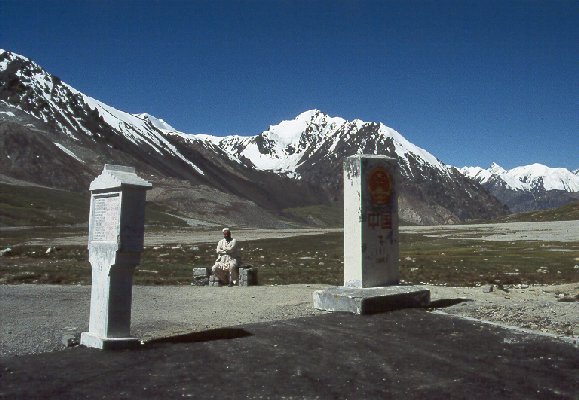 I’ve been three times in Pakistan. The First time for two weeks, as part of a travel from London to Kathmandu with Encounter Overland. The second time for a month, as part of a journey from Indonesia, Singapore, Malaysia, Thailand, Hong Kong, China and Pakistan. The last time for four weeks to the Himalayas in the north.
I’ve been three times in Pakistan. The First time for two weeks, as part of a travel from London to Kathmandu with Encounter Overland. The second time for a month, as part of a journey from Indonesia, Singapore, Malaysia, Thailand, Hong Kong, China and Pakistan. The last time for four weeks to the Himalayas in the north.
Music
Anecdote
I arrived in Pakistan from China, via the Karakoram “highway” over the Khunjerab pass (4780 mtr, the highest borders in the world. The mountains are really breathtaking.
In my opinion these mountains are much steeper than the ones in Nepal, and about the same height. To see the sky, you really need to look straight up, and then you can see some deep blue sky between ultra white snow on the peaks. The road is blown through the mountains by the Chinese, with loads of dynamite. In the middle there’s a weird plain green field, with rocks of snow scattered around. That’s were China ends and Pakistan begins. The Pakistani highway looks as though it’s made just recently, but that impression ends a few mile further down.
 The landscape is immense, impressive and barren. Also kind of chilly. I feel like a miniscule dot in a monstrous landscape in white, gray, yellow and deep blue on top. The road bends for ages between streams and rivers, and the perspective is starting to fade. A small rock in the distance appears to be hundreds of meters when you pass it, and a touch of snow appears to be the size of a full size ski piste. The cavern through which we descend is getting wider and wider, and turns into a valley. I look at the walls of these mountains, and it looks like we’re not making any progress at all. Only when you look down, you can see the bus dangerously flying over the road, allowing you to stare in the deep for just a few seconds. Sometimes the water down there seems to ripple, sometimes it looks like it’s boiling. We follow the water as it goes down in flows, streams and rivers.
The landscape is immense, impressive and barren. Also kind of chilly. I feel like a miniscule dot in a monstrous landscape in white, gray, yellow and deep blue on top. The road bends for ages between streams and rivers, and the perspective is starting to fade. A small rock in the distance appears to be hundreds of meters when you pass it, and a touch of snow appears to be the size of a full size ski piste. The cavern through which we descend is getting wider and wider, and turns into a valley. I look at the walls of these mountains, and it looks like we’re not making any progress at all. Only when you look down, you can see the bus dangerously flying over the road, allowing you to stare in the deep for just a few seconds. Sometimes the water down there seems to ripple, sometimes it looks like it’s boiling. We follow the water as it goes down in flows, streams and rivers.
The valley widens up, and I see a flock of sheep with a shepherd. Then the bus stops at a hamlet, with the customs checkpoint. There a men with a face like Ayatollah Khomeini had me check my luggage, whilst he was sitting comfortably. Pakistan is made dry, no alcohol whatsoever. Look, two bottles hidden in my backpack. The man frowned when I replied to his question what those were: A bottle of Mao Tai ( a Chinese kind of hard liquor, 50 % vol) and a bottle of Blandy (yes indeed, the Chinese can’t pronounce the ‘r’ as in brandy). Does he want one, I offered to no use. Piss off, he seemed to say. Ok, but that was a close one.
Next to the customs checkpoint there was a little restaurant. It looked appealing, whilst I couldn’t say that about many restaurants I’ve visited in China. The waiter didn’t need my attention, he came all by himself. Amazing. Then he offered a menu by himself, in English. Can I pay in dollars? Yes, sure. So I ordered dal and chappati. After taking the order, he went to the kitchen, turned around and asked me if I wanted to drink something. All by himself. How unlike three long months in China.
What a splendid place, and the food was great. I felt in heaven.
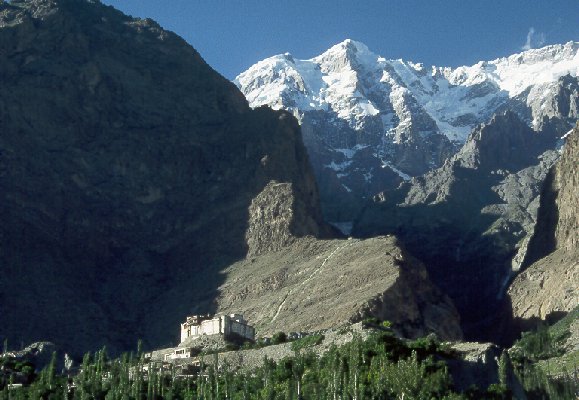 Later on the bus continued through green valleys, and in a distance I noticed an impressive castle, Karimabad, way up in the mountains. We spent the night in a village nearby.
Later on the bus continued through green valleys, and in a distance I noticed an impressive castle, Karimabad, way up in the mountains. We spent the night in a village nearby.
The next day the bus continued completely empty, as all tourists wanted to check out that castle. 1000 years old, once the stronghold of a rich empire controlling the path between China and former India, also known as the southern silk road. The villagers speak English, and they’re a proud and noble people.
A few day later my bottle of Blandy is empty (with which you get a lot of friends in a country that’s made dry). After climbing around in the neighbourhood, I hired a local guide, together with some other tourists, to visit a great glacier. To the start by jeep, and then up. Many, many hours later we looked down from high altitude towards this magnificent glacier, which resembled a white highway with a shoulder in the middle.
Even more up, I noticed two little shacks, glued to the wall. A very friendly shepherd invited us for some water and tea. Exactly what I needed. Great guy, it was just his rifle that looked odd.
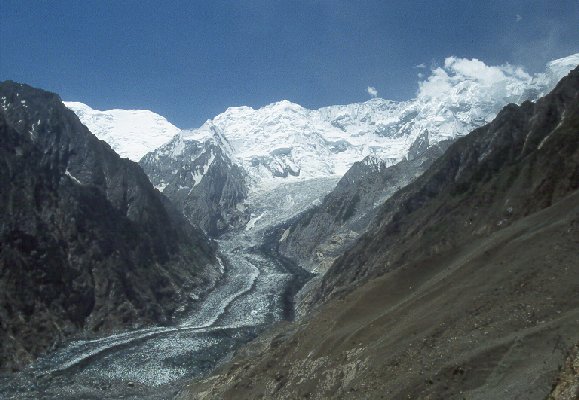 We asked the guide if it was possible to go down to the glacier, towards that beautiful light blue lake in the middle. Yeah, no problem, said this twelve year old dude (more experienced guides were much more expensive). There’s even a path going back, near the glacier. The start of the descend wasn’t too steep, but the more you go down, the tougher it gets. Quite dangerous with inexperienced tourist above you, kicking loose all sizes of stones which make this strange whoosh sound when they pass your ears.
We asked the guide if it was possible to go down to the glacier, towards that beautiful light blue lake in the middle. Yeah, no problem, said this twelve year old dude (more experienced guides were much more expensive). There’s even a path going back, near the glacier. The start of the descend wasn’t too steep, but the more you go down, the tougher it gets. Quite dangerous with inexperienced tourist above you, kicking loose all sizes of stones which make this strange whoosh sound when they pass your ears.
Reaching about 100 meters above the glacier, it became more difficult. The path was quite steep, and below I could see that the glacier was covered with giant spikes in shades of blue, and razor sharp spines, which all seemed to whisper “come nearer”, with a creepy sense of humour. We could forget about the little lake.
We could forget about the path, too, as there was no path. Someone made some kind of “footsteps” by hand against a vertical wall. Bend down, and shift a bit of loose sand down till it forms a small plateau, on which toy can put one foot. At the new position, do the same. The sand is pretty loose, the wall is quite steep, to 70%, and it’s hundreds of meters down.
I used the little footsteps to move on, and tried not to focus on the inviting glacier. Halfway I noticed the next footstep was missing. Could have been the guide’s fault, as he was running ahead for hundreds of meters. To continue would be madness, and I decided to go back, climb up the mountain till the track, and probably arrive then next morning. When I looked back, I noticed to my horror that I destroyed the footstep behind me. Here I was, stuck to the wall, not able to go forwards or backwards.
I was very much aware that this was my end, cursum perficio, goodbye to all that, and I saw the inviting spikes of ice, about hundred meters below, patiently waiting for me. In case the sand would shove down together with me, I should remember to put my fingers and nails into the soft sand as kind of a brake. And I should avoid to hit that rock about half way down. And that part of the slope is definitely a no go.
I tried not to panic, and in despair I ran over the steep sand wall. Against all odds I arrived at a more comfortable place. Behind that there was another stretch of some few hundred meters of pure mountaineering excitement. So far, so good, and I continued over that as well. God, Allah and Shiva were merciful, I survived and arrived at a proper track with a width of at least fifteen luxurious centimetres.
My eyes filled up and I started crying from stress, and also a tear of happiness, I should add. Then I spotted an old lady coming my way. Out of pity, she gave me some dried apricots, and continued her way, straight over the ramp which nearly killed me. Too bad my Blandy was finished. Much later at home, when I told my friends about this, they thought me to be courageous to admit my tears to them, rather than supporting me in my near death experience. Also in your own country you can be amazed by local habits.
Google-earth can check this place by clicking here.
 Later I went to Gilgit, a local town, with two fellow tourists. Gilgit was a beautiful place, with a touch of a garrison city. According to the locals it has the longest suspension bridge in the world, and for sure it wasn’t a small one. I told my two companions that I read about this excursion by jeep, organized in Gilgit. In three days going to Chitral in the west site of Pakistan, over and through high passes straight through the rough part of the Himalayas.
Later I went to Gilgit, a local town, with two fellow tourists. Gilgit was a beautiful place, with a touch of a garrison city. According to the locals it has the longest suspension bridge in the world, and for sure it wasn’t a small one. I told my two companions that I read about this excursion by jeep, organized in Gilgit. In three days going to Chitral in the west site of Pakistan, over and through high passes straight through the rough part of the Himalayas.
They loved the plan, and we got a jeep with driver for 100 US $ each, which isn’t much for that excitement, really. We had to buy lots of food, as there wasn’t much to get on the track. There would be some villages, but extremely poor, without anything. So here we started an excursion which I can recommend to everyone.
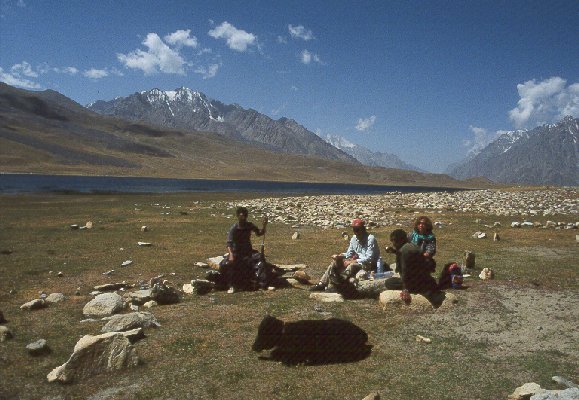 The driver advised us to buy some shawls and keep them to cover our mouths, to protect against the dust. And buy some fishing hooks, to supply us with dinner. Just those advises made me eager to start. Yes! A long wild journey. We immediately entered a small valley with huge mountains, which became higher and more desolate the more we drove. Unbef*ckinglievably beautiful. Engine off at descends to reduce gasoline consumption, full speed up on the next ramp while horning, as there was no way to predict what was coming from around the bend. Nothing, hopefully, as these tracks don’t really allow anyone to take over. We passed some poor fields where nothing seemed to grow, we passed some ice cold lakes, and some hamlets where there was hardly anyone. One hamlet even had a restaurant, as basic as it gets. They already prepared some food, soup with mildly spiced dall, and the choice was to eat it or not. Great folks. We also passed several check points, where soldiers made us sign the guest book. Many tourists signed with “Santa Claus”, “Aboninable Snowman” etc. etc, which isn’t too smart as the main reason for signing is to assist with rescue operations. A few years later my wife turned out to be the first Bolivian ever driving through these mountains.
The driver advised us to buy some shawls and keep them to cover our mouths, to protect against the dust. And buy some fishing hooks, to supply us with dinner. Just those advises made me eager to start. Yes! A long wild journey. We immediately entered a small valley with huge mountains, which became higher and more desolate the more we drove. Unbef*ckinglievably beautiful. Engine off at descends to reduce gasoline consumption, full speed up on the next ramp while horning, as there was no way to predict what was coming from around the bend. Nothing, hopefully, as these tracks don’t really allow anyone to take over. We passed some poor fields where nothing seemed to grow, we passed some ice cold lakes, and some hamlets where there was hardly anyone. One hamlet even had a restaurant, as basic as it gets. They already prepared some food, soup with mildly spiced dall, and the choice was to eat it or not. Great folks. We also passed several check points, where soldiers made us sign the guest book. Many tourists signed with “Santa Claus”, “Aboninable Snowman” etc. etc, which isn’t too smart as the main reason for signing is to assist with rescue operations. A few years later my wife turned out to be the first Bolivian ever driving through these mountains.
The first night we slept in the house of a noble man, the second in a school annex hospital, and the third at a family of farmers. Meanwhile we ascended till snow level, and saw yaks grazing in this desolate and magnificent landscape. You really should check this out. Rough terrain, great mountains, full gas when climbing, whilst pulling the horn as you can't see what's around the next bend. Descend in neutral to save gas. Occasionally a small village with close to nothing
The last day we had to change a tyre, and a few hours later the driver discovered his bag with personal belongings was missing. To his amazement we agreed to go back. After an hour we met another truck, and our driver shouted something at them. They gave him the bag they found on the road. Another happy camper.
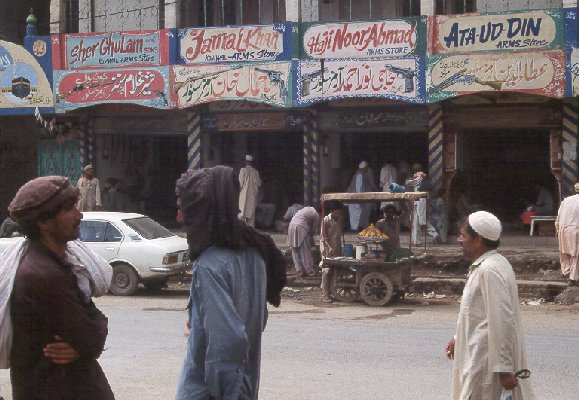 Much later, near the beautiful town of Peshawar, there’s this village called Darra. In 1990 this was the center of weapon production, to supply the Taliban with a range of weapons, being transported from Peshawar to Afghanistan over the famous Khyber pass. A spectacular village, one weapon smith next to another, with beautiful billboard in Indian style, to advertise their merchandise.
Much later, near the beautiful town of Peshawar, there’s this village called Darra. In 1990 this was the center of weapon production, to supply the Taliban with a range of weapons, being transported from Peshawar to Afghanistan over the famous Khyber pass. A spectacular village, one weapon smith next to another, with beautiful billboard in Indian style, to advertise their merchandise.
A persistent arms trader tried to sell me a one shot pencil gun. My biggest enemy was my landlord, but to settle our dispute I’d rather use our legal system. I walked around a bit, and heard a burst of machine gun fire. I turned around and saw a man with an afghan turban, adoring his merchandise. I continued and was invited at a blacksmith. They made their own Russian pistols. Do I want to try one, for free?. For sure. I only had to make sure that I aimed at a certain mountain. Any local knew not to climb that mountain. Was I interested in a round with an AK45 (Kalashnikov), for only 10 US$ ? Forget it. Try a bazooka for 50 US$ ? I was tempted, but refused, as this was way too expensive. They explained that whilst they make the launcher, all rockets needed to be imported. At least I discovered to definitely not climb that particular mountain.
 At another blacksmith I noticed a boy with a wooden hammer, hitting bullets in cartridges loaded with gunpowder. Recycling is the name. I’ve got this feeling he won’t get old, as one spark would ignite some hundred open cartridges with gunpowder, with a penetrating impact on his face. At another blacksmith I saw two boys in a kind of rock chair, polishing a twist in the barrel of a gun, to give the bullet a spin. Somewhere else they lifted the cover of a big machine, revealing some kind of tractor seat. It turned out to be an anti aircraft artillery with two .50 machine guns. Care for a ride? In the mean time I was offered lots of tea with biscuits from these very friendly people. No kidding, these guys were very hospitable and treated me as a king, whilst knowing that I would definitely not buy any hand grenades, guns or bazookas. Great people, they didn’t bother about politics or religion. It’s just that you shouldn’t camp at a certain mountain.
At another blacksmith I noticed a boy with a wooden hammer, hitting bullets in cartridges loaded with gunpowder. Recycling is the name. I’ve got this feeling he won’t get old, as one spark would ignite some hundred open cartridges with gunpowder, with a penetrating impact on his face. At another blacksmith I saw two boys in a kind of rock chair, polishing a twist in the barrel of a gun, to give the bullet a spin. Somewhere else they lifted the cover of a big machine, revealing some kind of tractor seat. It turned out to be an anti aircraft artillery with two .50 machine guns. Care for a ride? In the mean time I was offered lots of tea with biscuits from these very friendly people. No kidding, these guys were very hospitable and treated me as a king, whilst knowing that I would definitely not buy any hand grenades, guns or bazookas. Great people, they didn’t bother about politics or religion. It’s just that you shouldn’t camp at a certain mountain.
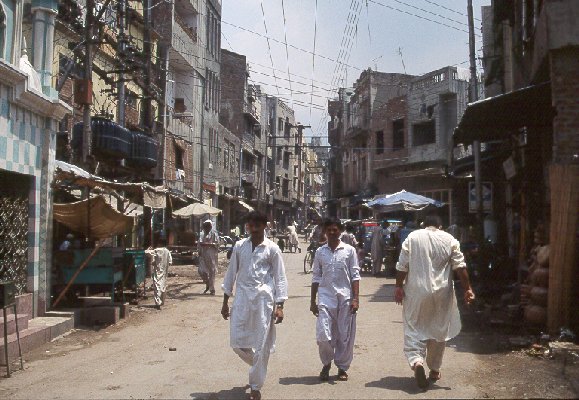
Back in Rawalpindi, a nice big city near Islamabad, I started to get bored. No more excursions planned, and all the tension from China was over, for example if I wanted to buy a ticket I actually got one without a hassle or resistance. Everybody spoke English. The people were friendly, proud, helpful and nice. Frequently I had dinner in 5 star hotels, where they served full buffets in oriental style and western style for about 7 US$. Of course I didn’t lodge there, I preferred rock bottom hotels without airco, as these give you a cold whack in the face when you enter, and a hot one when you go out. A fan does the trick. In such a small hotel I met someone from Denmark, to sleep in the same dormitory. His eyes nearly popped out when I showed my bottle of Mao Tai, smuggled from China. I cut the metal top before unscrewing it. In third world countries this is common sense, as you won’t be able to close it up once the fragile screw in the top is damaged. I place the bottle on the table, and this Danish fool tripped. The bottle fell on the floor and broke into a thousand pieces, no drop to recycle. It’s hard to imagine the disappointment. The room got filled with a stench of Mao Tai, which is something between kerosene and spoiled potatoes. No kidding. That night turned out to be the only night without these dreadful knut, small biting insects.
In the 5 star hotels they also serve beer, but as I mentioned, Pakistan is made dry, no alcohol. Big hotels have non-muslim rooms, where they serve beer at outrageous prices to the infidel. On Thursday I went to the Australian embassy, to celebrate the thank god it’s Friday party and get some beer. Indeed the weekend starts on Thursday.
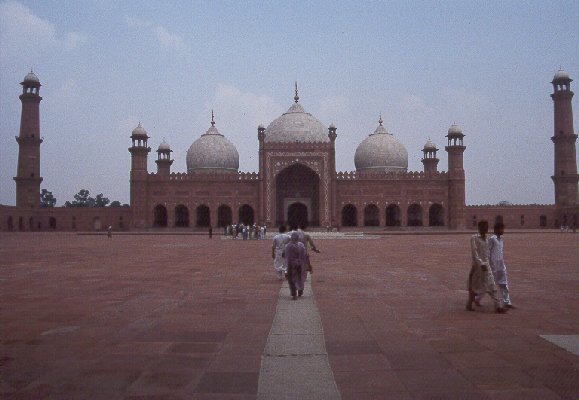 Because I was so bored, missing challenges, I decided to get a non-muslim declaration, by which I could buy a limited amount of beer in the 5 star hotel, at local rate. So I went to the ministry of interior. There I had to wait and wait, only to be referred to another queue. Man, I felt like back in China. Finally they asked for my tax certificate. I had to buy one at a bank in the center. No worries. At the bank there was this brother of Ayatollah Khomeini, explaining me extensionally on the potential dangers of intoxicating liquor. Me like danger. The man had no sense of homour, and gave me more lectures. I just repeated my request over and over again, and he finally gave in. I got my tax certificate. With this I returned to the ministry of interior, which was closed by now. The next day I continued my quest, and informed a diplomat from Angola with the same quest how the procedure worked. Again waiting and waiting, and was then asked to supply a copy of my passport. I went to the local market, where I’ve spotted an Indian style billboard with a Xerox machine. There I had to wait for another customer who also wanted a copy. My passport and his paper went on the glass, and a copy was made. The operator tore the A4 copy apart, and gave my half to me. Efficiency was his middle name. With this I returned to the ministry, where I finally was invited to a room where a Don Corleone type was surrounded by capos. He also had some trick questions which I knew how to answer, one assistant made some notes in my passport, and another filled in a form. Don Corleone signed it, and now I was officially licensed to buy 50 bottles of beer a month, 5 bottles of whiskey or a combination of these. The number of this form was written down in my passport. You won’t realize it, but you’re reading the homepage of someone licensed to drink.
Because I was so bored, missing challenges, I decided to get a non-muslim declaration, by which I could buy a limited amount of beer in the 5 star hotel, at local rate. So I went to the ministry of interior. There I had to wait and wait, only to be referred to another queue. Man, I felt like back in China. Finally they asked for my tax certificate. I had to buy one at a bank in the center. No worries. At the bank there was this brother of Ayatollah Khomeini, explaining me extensionally on the potential dangers of intoxicating liquor. Me like danger. The man had no sense of homour, and gave me more lectures. I just repeated my request over and over again, and he finally gave in. I got my tax certificate. With this I returned to the ministry of interior, which was closed by now. The next day I continued my quest, and informed a diplomat from Angola with the same quest how the procedure worked. Again waiting and waiting, and was then asked to supply a copy of my passport. I went to the local market, where I’ve spotted an Indian style billboard with a Xerox machine. There I had to wait for another customer who also wanted a copy. My passport and his paper went on the glass, and a copy was made. The operator tore the A4 copy apart, and gave my half to me. Efficiency was his middle name. With this I returned to the ministry, where I finally was invited to a room where a Don Corleone type was surrounded by capos. He also had some trick questions which I knew how to answer, one assistant made some notes in my passport, and another filled in a form. Don Corleone signed it, and now I was officially licensed to buy 50 bottles of beer a month, 5 bottles of whiskey or a combination of these. The number of this form was written down in my passport. You won’t realize it, but you’re reading the homepage of someone licensed to drink.
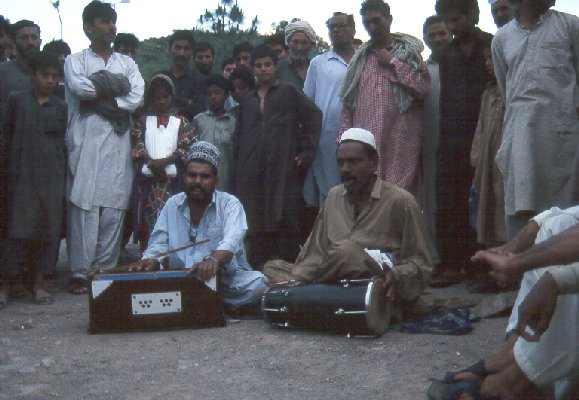 With this well deserved document I went to the 5 star hotel. In an unappetizing cellar there was a desk which opened between 19:00 and 19:15, to sell alcohol to non-muslims. I wasn’t even surprised it remained closed. I went to the reception to complain about this discriminating behaviour, and the floor manager promised to do better. The next day I was there again, on time, and again I was the only buyer. Eventually they sold me beer and whiskey at local rate. They were rapped in newspaper, in order not to reveal the content of my daybag to people on the street, by tinkling sounds. I also had to promise not to open the daybag before arriving in my hotel, at penalty of jail for offensive behaviour.
With this well deserved document I went to the 5 star hotel. In an unappetizing cellar there was a desk which opened between 19:00 and 19:15, to sell alcohol to non-muslims. I wasn’t even surprised it remained closed. I went to the reception to complain about this discriminating behaviour, and the floor manager promised to do better. The next day I was there again, on time, and again I was the only buyer. Eventually they sold me beer and whiskey at local rate. They were rapped in newspaper, in order not to reveal the content of my daybag to people on the street, by tinkling sounds. I also had to promise not to open the daybag before arriving in my hotel, at penalty of jail for offensive behaviour.
That night I organized a booze party in the dormitory of the hotel, with other backpackers whi wouldn’t believe this. The next morning I noticed that the beer and whiskey where made in Murree, Rawalpindi, Pakistan. What a bunch of hypocrites.
After Pakistan I’m out of money, and out of tolerance to have no privacy whatsoever, so I returned home after a trip of half a year. A few years later I returned, now with my wife an my good friend Peter.
I like Pakistan that much, that I put my complete photo-album on my website.